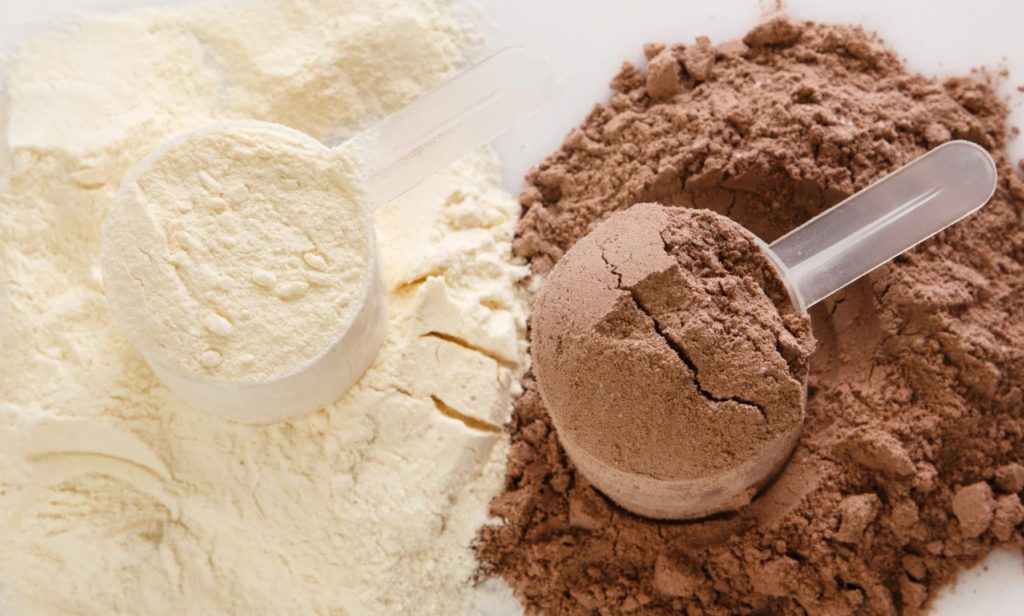Protein powder is a powdered form of protein used as dietary and bodybuilding supplements. The protein powder protein comes from plant products, milk, and eggs.
So, which one should you buy? There are various types of protein powders available in the market.
And this article will help you out a little by differentiating the two most common protein powders, plant protein, and whey protein.
Difference Between Plant Protein and Whey Protein

Let us see the difference between plant protein and whey protein, based on 12 different aspects!
1. What are plant protein and whey protein?
Whey protein is one of the types of protein supplements found in dairy products. It has all the essential amino acids your body requires to perform proper functions. You can get whey protein in three types: whey protein concentrate, whey protein isolate, and whey protein hydrolysate.
And a plant protein is a protein powder extracted from plant sources. They come in numerous types like pea protein, brown rice protein, etc. Plant protein powders are naturally vegan and could be added to any diet plan. Also, it is unlikely to cause any kind of allergic reactions for even diseased people.
2. How are they made?
Whey protein is the byproduct of the cheese-making process. First, fresh cow’s milk is collected and pasteurized to remove the bacteria, and then enzymes are added to separate the curd. The leftover liquid on the top of the curdled milk is called whey liquid. This whey liquid is then filtered to remove carbohydrates, fats, and water to get the base for whey protein powder. After the last process of ultra-filtration and drying, you get the whey protein powder.
And the manufacturing of plant protein powders is conducted using grains, seeds, or legumes, depending on the type. The grains, seeds, legumes are crushed, and then the fats and carbs are removed from it. And the protein compounds are isolated and packed.
3. Nutrient deficiencies
Whey protein powder provides enough protein but lacks other nutritional elements. And if on a diet, you rely entirely on whey protein powder, it will cause a nutritional deficiency in you.
On the other hand, plant protein powder has both protein and nutrients to replace a meal. It is packed with the goodness of iron, fiber, sodium, and more, depending on the type of plant protein powder you choose.
4. What to take alongside?
To enjoy the benefits of whey protein powder, consider taking low-calorie and sugar-free food products with whey protein powder. Either mix a scoop of whey protein powder to water, milk, black coffee, or coconut water. You can also add it to your meal by mixing it with oatmeal, pancake batter, mashed potatoes, waffles, etc. You can also replace a meal with whey protein powder for weight loss, but not all-time meals.
To intake plant protein powder, you can do the same as mentioned above for whey protein powder. You can make a smoothie blending some fruits or drink it with chilled water or healthy liquids. And like whey protein powder, you can add plant protein powder to your cooked meal or replace one meal.
5. Percentage of protein
The concentrate whey protein will have 65% to 75% protein content, and isolate whey protein will have 90% protein. And the hydrolyzed whey protein will have the highest percentage of protein, that is, 90% to 94%. So, if you stick to buying whey protein powder, choose any one type according to the need for protein content you require based on your goal.
And in plant protein powder, the percentage of protein may vary between 60% to 80% for various types. Some plant proteins have less protein content and high nutritional values other than protein. For example, pea protein powder has 23% to 30% protein content but has all essential amino acids for dietary requirements with other nutritional constituents.
6. Lactose content
Again, the percentage of lactose varies in whey protein powder depending on the type. A concentrated whey protein has average lactose and fat content in the form of milk sugar. And an isolate whey protein powder has low lactose and fat percentage. On the other hand, a hydrolyzed whey protein has no lactose and fat content.
Plant protein has 0% lactose content as they come from plant sources and not dairy products. Therefore, this vegan dietary supplement is best for vegans and lactose-intolerant people.
7. Vegan or not?
As mentioned above, whey protein powder is a byproduct of the cheese-making process. Therefore, it is vegetarian but not a vegan supplement.
On the other hand, plant protein powder extracted from plant sources is completely vegan. So, for vegan plant protein powder, you can go for pea, sunflower, chia, brown rice, hemp, chia, pumpkin, etc.
8. How much to consume?
You can consume 25 to 50 grams of whey protein powder in a day, diving into 2 scoops. And if you take more than 25 to 30 grams a day, divide it into 4 meal times in 4 scoops. An athlete can take 1.2 to 2 grams of protein powder per kg of their body weight daily.
On the other hand, plant proteins are safer to consume even in higher quantities. A man can have around 63 grams of vegan protein per day, and a woman can have 52 grams per day. And an athlete can have 1.8 grams of protein per kg of their body weight daily.
9. Health-wise benefits

Whey protein powder is a good option to include in your diet if you want to lose weight or have blood pressure issues. It is best for athletes for muscle building, healing wounds, and fulfilling daily protein requirements. Whey protein powder also has anti-cancer properties and is suitable for asthma, lowering cholesterol, and cardiovascular issues patients.
On the other hand, plant protein powders are beneficial for building healthy muscles and tissues, losing weight, adding nutritional value, and reducing the risks of various chronic diseases and allergies.
10. Side effects
Whey protein may cause stomach aches, nausea, reduced appetite, headache, fatigue, cramps, and digestive issues in some of you. Why? Due to more than enough quantity intake or because you are lactose intolerant.
On the other hand, plant protein powder has fewer side effects than whey protein powder. If not taken in proper quantity or with a proper meal, it may cause unbalanced nutrient composition, gastrointestinal issues, and acne due to inflammation. It may also increase insulin levels in some of you.
Tip: Before starting intake of any type of protein powder, consult your doctor to avoid side effects.
11. Easy to digest or not?
A good quality whey protein powder is easy to digest as it contains all essential amino acids. People with lactose intolerance may face difficulty in the digestion of whey protein.
On the other hand, plant protein powder lacks some amino acids causing difficulty in digestion. But, some of the plant protein powder is easy to digest because of the presence of fibers and enzymes.
Tip: You can eat acidic food with protein powders for easy digestion.
12. Cost
The price of both plant protein and whey protein powder depends on the brand, quality, and serving size. Their price is almost similar and ranges between Rs. 400 to Rs. 20,000.
You May Also Like to Read:
How Does Pea Protein Powder Compare to Whey Protein?
The Difference Between Plant and Animal Protein
How to Choose the Best Whey Protein Powder?
Bottom Line
Whey protein powder is the byproduct of the cheese-making process, whereas plant protein powder is extracted from plant sources.
Whey protein powder has all essential amino acids but lacks other nutritional values. Unlike whey protein, plant protein lacks some amino acids but has many nutrients to provide you with a healthy vegan diet plan. They both have various benefits and side effects. To learn them in detail, read the whole article!
And after reading the article, do not forget to share your experience with us in the comment section below. Also, do tell us about which one you bought for yourself.


